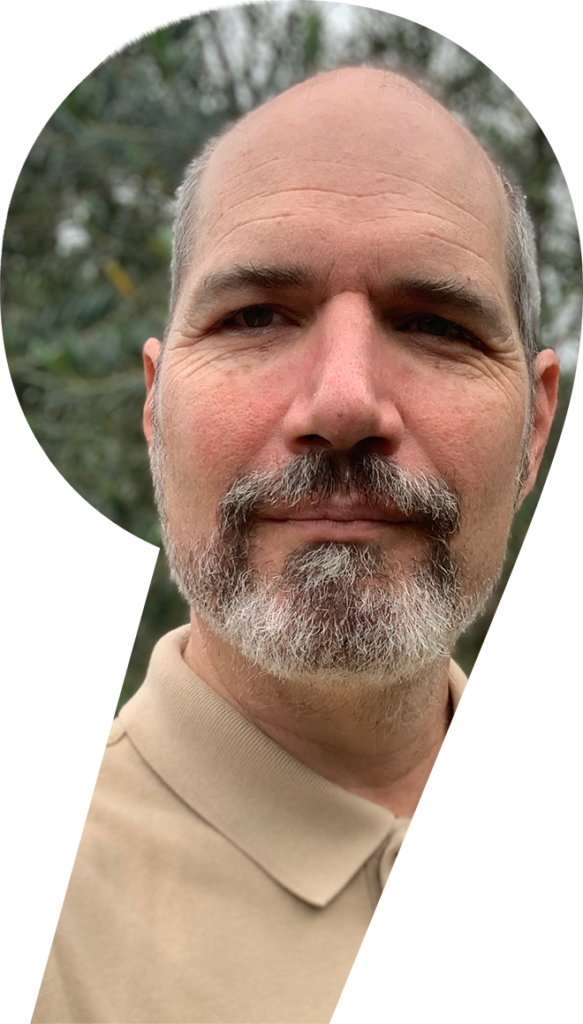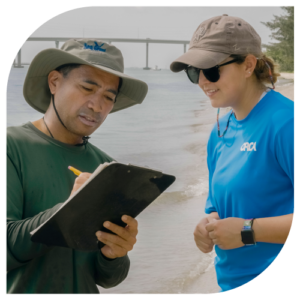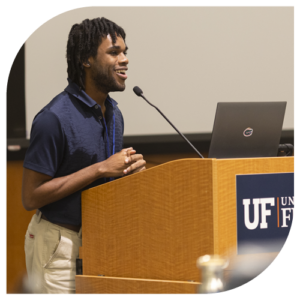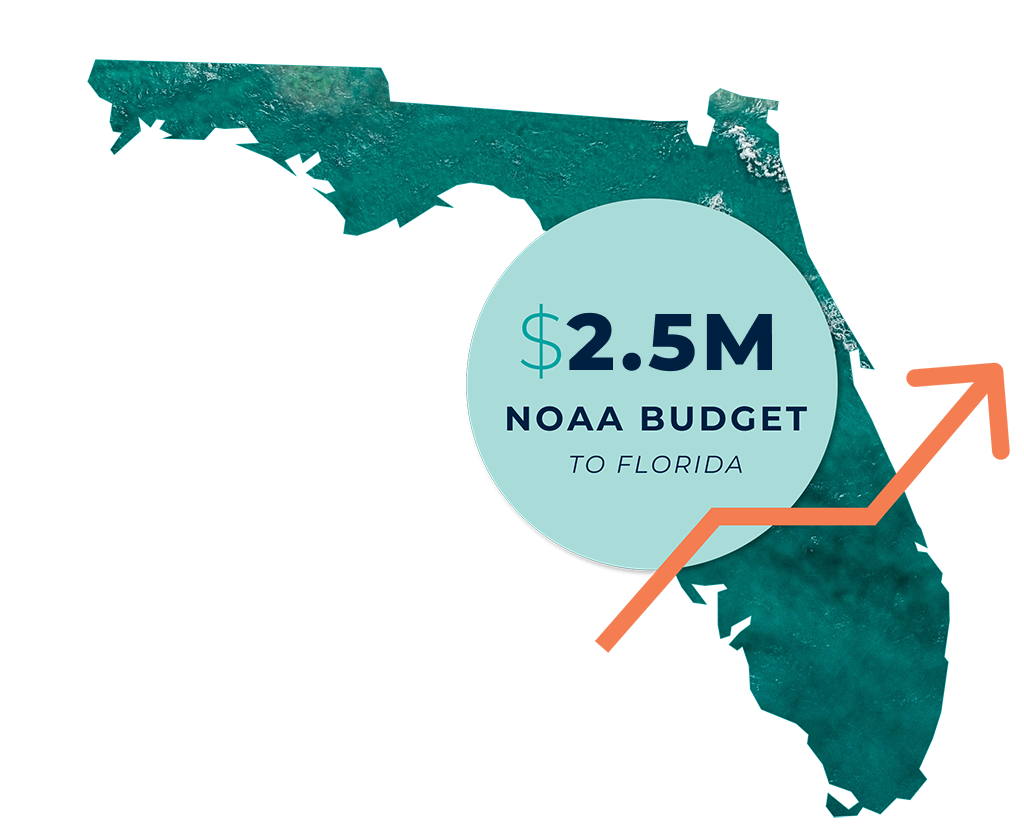Highlights
Science Serving Florida's Coasts
Serving
miles of coastline,
coastal residents, (77% of Florida's population), &
visitors.
Our
Research
Florida Sea Grant funds research that contributes to Healthy Coastal Ecosystems, Sustainable Fisheries and Aquaculture, and Resilient Communities and Economies.
New studies are examining solutions for harmful algal blooms, siting decisions for green infrastructure, improving fisheries and aquaculture, reducing marine debris and promoting spatial justice in revitalizing underserved coastal communities.

Florida, Georgia, South Carolina, and North Carolina Sea Grant programs joined forces on a multi-year project to investigate and design, with the the aid of local consulting environmental engineers, nature-based solutions to address chronic nuisance flooding. This regional project fostered teamwork that strengthened the impact of local adaptation measures and results.
Featured Impacts
Focus Area
Highlights
Learn more about FSG’s recent research, extension, and education initiatives around the state and region from 2020-2022. Expand each section to learn more about each project.
Sustainable Fisheries and Aquaculture

Women of the Water Steering Committee, including Dr. Laura Tiu, UF/IFAS Florida Sea Grant Extension Agent for Walton County (second row, far right), and Hayley Lemoine (first row, right), Aquaculture Communication Fellow. Credit: Women of the Water.
Sea Grant Trains and Develops a Network of Women in Aquaculture
For the second year in a row, Florida Sea Grant has helped create and sponsor a multi-day in-person conference to provide professional development, training, and networking among non-traditional aquaculturists in Florida. Participants share industry challenges, and research and Extension needs with Florida Sea Grant Extension agents, representatives of aquaculture associations and from the state’s Division of Aquaculture. To date, over 150 individuals have participated including representatives of several minority groups and numerous students. The network is growing and morphing with plans to expand programming in 2024.

Clam fishermen processing freshly harvested clams in Cedar Key, FL. Credit: UF/IFAS.
Sea Grant Continues Support for Aquaculture-Dependent Communities
Florida Sea Grant’s four-decades long aquaculture research and Extension programs continue to provide key resources and updated data to bolster Florida’s clam and shellfish industry – an industry that currently supports 543 jobs and $14.7M in labor income annually in underserved, rural coastal counties. This programming has grown from addressing production and marketing issues to policy changes that would ensure all aquaculture products are considered as agricultural products in the new Farm Bill. These efforts also provide key information to the new Congressional Aquaculture Caucus, that was established (in part) with support from Florida representatives.

Artificial in Taylor County, FL. Credit: Michael Dickson, UF/IFAS, Fisheries and Aquatic Sciences Program.
Sea Grant Ensures Florida’s Artificial Reef Program Flourishes
Florida Sea helps the state in managing, deploying and monitoring its network of 3,800 artificial reefs, that are used by 48% of Florida’s saltwater anglers targeting reef fish in the Gulf of America, and generating $3B in economic activity. This past year, Florida Sea Grant organized regional and statewide workshops for 154 of Florida’s county-based artificial reef managers that directly influenced the planning and management of the state’s system of artificial reefs. Keith Mille, Florida’s Artificial Reef Coordinator stated: “I wholeheartedly feel that Florida’s Artificial Reef Program would not be able to achieve our strategic statewide objectives without the critical support from Florida Sea Grant.”
Healthy Coastal Ecosystems

A diseased coral encountered by research divers in Broward County, FL. Credit: Shane O. Wever.
Sea Grant Coordinates Response to Coral Disease
Florida Sea Grant assumes a key role in supporting efforts to improve the health and restoration of coral reefs at state and national levels, especially in response to Stony Coral Tissue Loss Disease. In addition to disease identification and treatment, Florida Sea Grant co-authored NOAA’s Surveillance Guidelines for the Indo-Pacific in 2022 and the Implementation Plan for Response and Prevention in 2023. Within Florida, the program is administering five positions with funding from the Florida Departments of Environmental Protection and Fish and Wildlife Conservation Commission to significantly increase the effectiveness of collaborations and the capacity of state and federal agencies to plan for and implement actions designed to mitigate and remediate the impact of Stony Coral Tissue Loss disease, including through propagation and out-planting in the U.S.’ only barrier reef ecosystem in the Florida Keys.

Ana Zangroniz, UF/IFAS Florida Sea Grant Extension Agent for Miami-Dade County, stands in the water in front of mangroves while filming training video.
Sea Grant Trains Landscapers How to Trim Mangroves per Regulations
In Florida, 86% of mangroves have been lost. Florida Sea Grant developed best practice trainings, in English and Spanish, to ensure that mangroves remain intact and continue to preserve coastal infrastructure and shoreline stabilization. Programming has expanded by offering programs in multiple languages. The training programs promote compliant mangrove trimming practices for waterfront homeowners and landscaping professionals specifically. In 2022, 20 landscaping professionals completed the training program that was considered critical to their jobs; the training was valued at over $1M.
Resilient Communities and Economies

Living shorelines installation at Joe Rains Beach, Cedar Key, FL. Credit: Florida Sea Grant.
Sea Grant Builds Living Shorelines
Florida Sea Grant promotes the value of healthy coastal environments and the impact on community resilience by fostering the installation of living shorelines through contractor trainings, testing engineered products, creating installations, and partnering with Duke Energy to develop networks for growing and sourcing appropriate plant material. In 2023, 20 landscaping contractors participated in the inaugural training provided by Florida Sea Grant living shorelines specialists with their involvement valued at $17,000. The value of such installations was supported by wave sensors installed prior to Hurricane Idalia that indicated living shorelines dissipated wave impacts by over 20 percent, providing coastal residents and communities with cost-savings, retention of ecosystem services, and comparable protection to bulkheads.

Boats damaged from Hurricane Ian in Ft. Myers, FL. Credit: Mike Sipos, UF/IFAS Florida Sea Grant Extension Agent for Collier County.
Sea Grant Provides Hurricane Relief and Recovery
Florida Sea Grant provided timely response and relief to water-dependent communities and businesses affected by hurricanes Irma, Michael, Ian and Idalia. This response included the location and mapping of 400,000 displaced crab and lobster traps in the Florida Keys (Irma), locating and removing debris – including 25 large derelict vessels onshore – in the Florida Panhandle (Michael), mapping the extent of inundation and property damage on Sanibel Island (Ian), and, most recently, improving the resilience of Cedar Key shellfish aquaculture operations and clam leases to storms (Idalia), contributing to the profitability of 350 small family businesses and supporting 600 jobs.
Environmental Literacy and Workforce Development

Seafood processor tests filet with probe. Credit: Florida Sea Grant.
Sea Grant Provides Workforce Development to the Seafood Industry
Florida Sea Grant introduced the HARVEST program (Helping Aquaculture Reap Value and Extend Student Training), matching Extension agents, research specialists, and students with aquaculture businesses to address production bottlenecks. The HARVEST program has helped aquaculture businesses on issues ranging from production through trade and has produced new aquaculture investors and new federal policy recommendations. To support the seafood industry in general, Florida Sea Grant has continued to provide HACCP (Hazard Analysis Critical Control Point) certification and Shellfish Harvester Training. From 2020-23, Florida Sea Grant’s HACCP program certified 233 seafood workers, valued at $9.5M.

Fish on descending device being returned to depth. Credit: Florida Sea Grant.
Sea Grant Increases the Sustainability of Recreational Angling
Through a cooperative agreement with the NOAA Restoration Center, Florida Sea Grant created a brand and marketing campaign that involves increasing the environmental literacy of saltwater recreational anglers and within reef fish angling communities. Innovative business approaches and on-line education, certification and training from the innovative Return ‘Em Right program resulted in the distribution of 30K fish descending devices to Gulf of America reef fish anglers. These efforts have not only educated thousands of anglers, with substantial benefits to reef fish stocks, but the efforts have maintained an estimated 88,000 jobs and generated $9.2B in economic impact for the Gulf of America region.
featured video
Workforce
Development
Training for Natural Resource Professionals
Florida Sea Grant is a key player in a conflict management training program for natural resource professionals in the state of Florida. Sea Grant alum design the program’s classes and educate participants on the state’s coastal systems, directly impacting the growing alumni base of over 400 professionals across the state.
featured product
Reef
Prisms
Developed For Living Shorelines
The Partnership for Plastic-free Restoration of Oyster Shorelines, or PROS for short, is a network of practitioners, educators, and local government partners works toward implementing living shoreline projects using a newly developed plastic-free material called reef prisms. In 2022, Florida Sea Grant created an instructional video series on how to build plastic-free reef prisms which helped develop six new oyster restoration projects around Florida.
Current
Priorities

Coastal
Resilience
Supporting research, training, technical assistance, and coordination to help address resilience needs at the state and local levels.

Sustainable Aquaculture
Supporting research, technical assistance, and outreach to producers, resource managers, and consumers to ensure the safety, quality, and profitability of cultured products.

Student Opportunities
Supporting education, research, training, mentorship opportunities, and real-world work experience for students at Florida-based institutions across the state.
FY2022-2023
Programmatic
Impact
From FY 2022-2023, a core federal investment in Florida Sea Grant of $2.5 million resulted in over $15 million in economic benefit.

$15M
Generated Economic impact
For a return on investment of 6:1 over Florida Sea Grant’s core NOAA budget, the program has generated over $15 million in direct economic impacts for the year. Recent projects include installing new artificial reefs, helping homeowners lower flood insurance premiums, providing discounted food safety training, increasing the profitability of shellfish aquaculture farmers, improving red snapper fingerling production, and certifying more Florida Friendly Fishing Guides to bolster sustainable recreational reef fishing.
36
Businesses supported
Coastal and marine-dependent businesses are the focus of Extension programming statewide. In 2022-23, Florida Sea Grant Extension agents supervised interns working to remove bottlenecks to local aquaculture production through the HARVEST program (Helping Aquaculture Reap Value and Enhance Student Training), helped teach Living Shorelines Training for Marine Contractors programs across the state, and enrolled 1,343 participants in the Florida Friendly Angler Certification Program, a course that teachers anglers about sustainable fishing and boating practices.
290
Jobs supported
In 2022-23, Florida Sea Grant’s boots-on-the-ground local programming – administered through 21 Extension agents working statewide – has increased the skills of employees in several industry sectors including recreational and commercial fishing, seafood wholesale and retail operations, aquaculture (especially for clam and oyster growers), and marine contracting businesses that seek to improve coastal resilience through increase use of nature-based shoreline reinforcement.
FUNDING & IMPACTS TO DATE FROM PROGRAMMING IN SUPPORT OF FLORIDA’S FY2018-2023 STRATEGIC PLAN